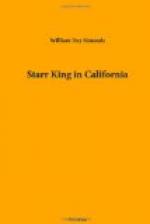In this connection it should be remembered that when President Lincoln at the outbreak of the war called for 75,000 men, California was expected to furnish her quota of 6,000 soldiers, but so threatening was the local situation that not a loyal man could be spared from the State. On the contrary it was found necessary to retain in the State certain regiments of the regular army badly needed elsewhere. In the summer of 1861, the War Department proposed to transfer a portion of the regular army stationed in California to Texas, where the situation demanded immediate succor for the friends of the Union. How grave the situation had become in California may easily be determined by a fact which seems to have escaped so far the attention of historians. On August 28, 1861, the leading men of San Francisco sent a communication to Hon. Simon Cameron, Secretary of War, remonstrating against the withdrawal of United States troops from California for the following reasons:
1. “A majority of our present state officials are avowed secessionists, and the balance being bitterly hostile to the administration are advocates of a peace policy at any price.”
2. “About three-fifths of our citizens are natives of slave-holding states and are almost a unit in this crisis.”
3. “Our advices, obtained with great prudence and care, show us that there are about 16,000 Knights of the Golden Circle (a secret military organization of secessionists, said by many authorities to have been much stronger than was at the time believed) in the state, and they are still organizing even in our most loyal districts.
4. “Through misrepresentation the powerful native Mexican population has been won over to the secession side.”
This document, remarkable in itself, becomes weighty evidence, when it is stated that after full and careful consideration, the petition was heeded and the regulars remained on the Coast.
General Sumner held command nearly a year, until, as we are accustomed to think, all danger of a disloyal California was over, yet as the date of his departure for the Army of the Potomac drew near, he was very anxious that Col. Wright, an able and loyal officer, should fill his place, and wrote to the authorities in Washington, “Col. Wright ought to remain in command. The safety of the whole coast may depend upon it.” (italics ours).
A few weeks after the death of Starr King, the Pacific Monthly, leading magazine of the day, reviewed the situation at the beginning of the great conflict, as it was then known and understood by all intelligent Californians:




